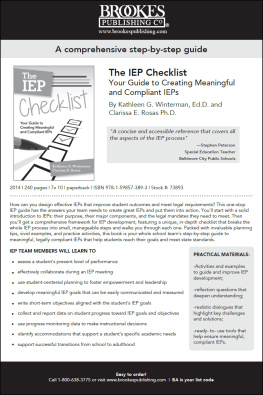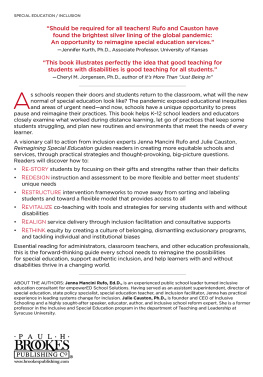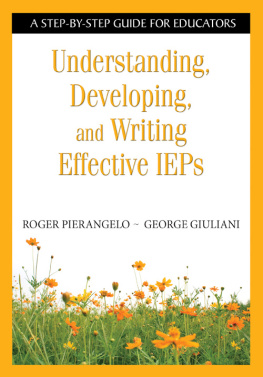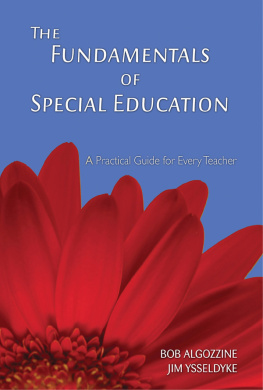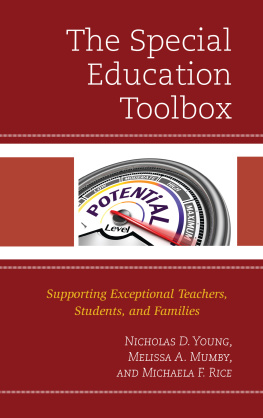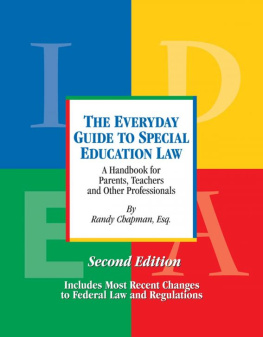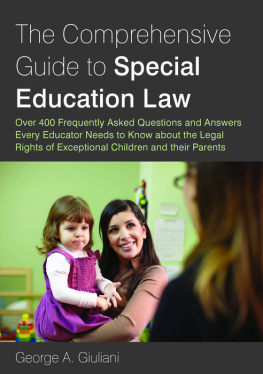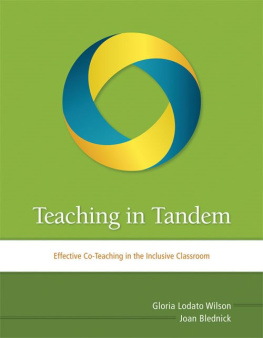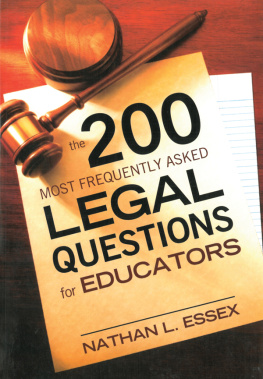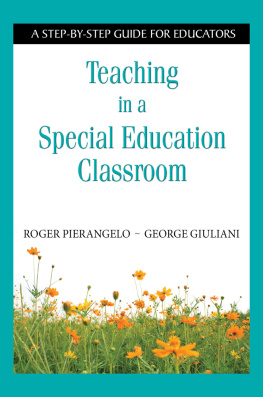Table of Contents
Page List

Your Classroom Guide to
Special Education Law
Your Classroom Guide to Special Education Law
by
Beverley H. Johns, M.S.
MacMurray College
Jacksonville, Illinois


Paul H. Brookes Publishing Co.
Post Office Box 10624
Baltimore, Maryland 21285-0624
USA
www.brookespublishing.com
Copyright 2016 by Paul H. Brookes Publishing Co., Inc.
All rights reserved.
Paul H. Brookes Publishing Co. is a registered trademark of Paul H. Brookes Publishing Co., Inc.
The individuals described in this book are composites or real people whose situations are masked and are based on the authors experiences. In all instances, names and identifying details have been changed to protect confidentiality.
Cover art istockphoto/kaisorn.
Library of Congress Cataloging-in-Publication Data
The Library of Congress has cataloged the print edition as follows:
Names: Johns, Beverley H. (Beverley Holden), author.
Title: Your classroom guide to special education law / Beverley H. Johns.
Description: Baltimore : Brookes Publishing, 2016. | Includes bibliographical references and index.
Identifiers: LCCN 2016000449 (print) | LCCN 2016016640 (ebook) | ISBN 9781598579710 (paperback) | ISBN 9781681250267 (pdf) | ISBN 9781681250250 (epub)
Subjects: LCSH: Special educationLaw and legislationUnited States. | Special education teachersUnited StatesHandbooks, manuals, etc. | BISAC: EDUCATION / Special Education / General. | EDUCATION / Educational Policy & Reform / General.
Classification: LCC KF4209.3 .J64 2016 (print) | LCC KF4209.3 (ebook) | DDC 344.73/0791dc23
LC record available at https://lccn.loc.gov/2016000449
British Library Cataloguing in Publication data are available from the British Library.
Version 2.0
About the Author
Beverley H. Johns, M.S., is a Professional Fellow for MacMurray College, where she teaches courses on special education law, emotional and behavior disorders, and diverse learners. She also teaches a class on autism at Illinois College. In addition, she is a learning and behavior consultant. She is a graduate of Catherine Spalding College in Louisville, Kentucky, and received a fellowship for her graduate work at Southern Illinois University (SIU) in Carbondale, where she received a master of science degree in special education. She has done post-graduate work at the University of Illinois, Western Illinois University, SIU, and Eastern Illinois University.
Ms. Johns has 40 years of experience working with students with learning disabilities (LD) and/or emotional and behavior disorders (EBD) within the public schools. She supervised LD and EBD teachers in 22 school districts, was the founder and administrator of the Garrison Alternative School for students with severe EBD in Jacksonville, Illinois, and was later the coordinator for staff development for the Four Rivers Special Education District.
Ms. Johns is the lead author of 13 books and coauthor of four others in the field of education, including the seminal college textbook, Learning Disabilities and Related Disabilities: Strategies for Success (13th Edition) with Janet Lerner (Cengage, 2015). She has written her first fiction book, Secrets of the Teachers Lounge (Truth Book Publishers, 2014). She wrote and appeared in a DVD for the Association for Supervision and Curriculum Development (ASCD), Conducting an Effective IEP Meeting Connecting to the Common Core, and wrote an online course for ASCD, Role of the Classroom Teacher in Implementing the Common Core for Students with Disabilities.
She has presented workshops across the United States and Canada and in San Juan, Puerto Rico; Sydney, Australia (keynote); Warsaw, Poland; Wroclaw, Poland (keynote); Hong Kong, China; Lima, Peru; and Riga, Latvia. She chaired the 10th Biennial Conference of the International Association of Special Education, held June 1014, 2007, in Hong Kong; served as President from 2006 until January 1, 2010; and presided over the 11th Biennial Conference in Alicante, Spain, in 2009. She presented the Inaugural Marden Lecture at The University of Hong Kong in January 2006.
She is the 2000 recipient of the CEC Outstanding Leadership Award from the international Council for Exceptional Children (CEC), Past International President of the Council for Children with Behavioral Disorders (CCBD), Past President of the CEC Pioneers, Past Secretary and Governmental Relations Chair for the Division for Learning Disabilities (DLD), current Secretary for DARTS (the newly formed CEC Division for the arts and special education), and the 2007 recipient of the Romaine P. Mackie Leadership Service Award. Ms. Johns is listed in Whos Who in America, Whos Who of American Women, Whos Who in American Education, and Whos Who Among Americas Teachers.
A Guide to Using This Book
Knowledge is power. People working with students with disabilities must be aware of the laws and regulations that provide protections to students, families, and educators. They must be lifelong learners and keep abreast of the laws and regulations that govern their practice. This book provides an overview of basic principles and laws that govern the field of education. It is not designed to be a reference book of all the laws and regulations for working with students with disabilities; there are several well-known texts and numerous web sites for this purpose. Rather, this book delves into the most critical laws that shape educational policy, explaining Section 504 of the Rehabilitation Act of 1973 (PL 93-112) and the Individuals with Disabilities Education Improvement Act (IDEA) of 2004 (PL 108-446). References are also made to the Family Educational Rights and Privacy Act (FERPA) of 1974 (PL 93-380), which governs the privacy of education records. This book is intended to be your guide to understanding basic education-related law as you work with a wide range of students in schools and classrooms. Reading this book is also meant to be an interactive experience in which you can apply your knowledge and think critically and creatively. Several activities, exercises, and features are included within each chapter and can be used for individual reader reflection, as part of an in-service day for educators, or as thought-provoking exercises for preservice teachers.
Each chapter introduces readers to a specific topic in special education law, opening with an overview of the core principles of the laws and regulations as well as critical court cases that provide insight into how to interpret the law. Each chapter includes a mnemonic to help readers remember key terms and ideas. Readers will also encounter a How Would You Rule? exercise in which they are invited to weigh in on a legal dispute in special education. After writing their answer in the space provided, they can read on to see how the court actually ruled. Every chapter also includes a comparison of two case studies depicting an everyday legal situation or challenge in special education, with one example of common mistakes made followed by an exemplary approach to handling a situation. These stories are meant to bring legal and ethical principles to light and invite you to compare and contrast effective ways to follow the law and serve students with disabilities. A list of common mistakes and solutions related to the chapter topic follows each case study comparison. Finally, each chapter ends with an Extras and Activities section that could be used for professional development, as educational activities for preservice educators, or as exercises to engage the individual reader. These extras include questions and answers related to special education law, quizzes, games, puzzles, and online activities. Readers are encouraged to interact with colleagues, reflect on the concepts discussed in the chapters, and have fun. As indicated in certain activities, see the books answer key appendix.

